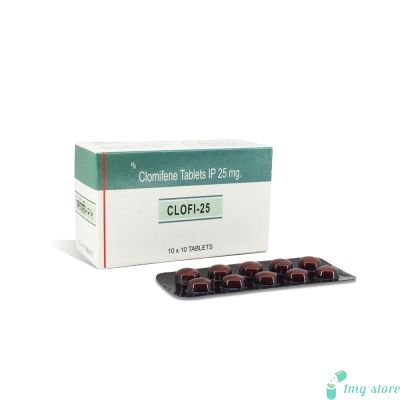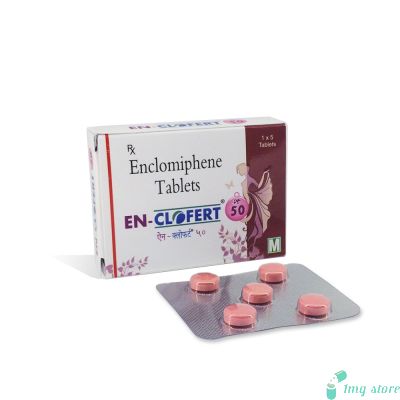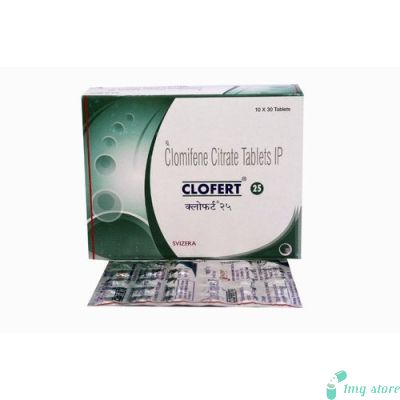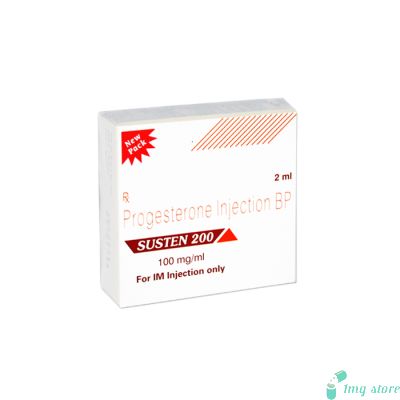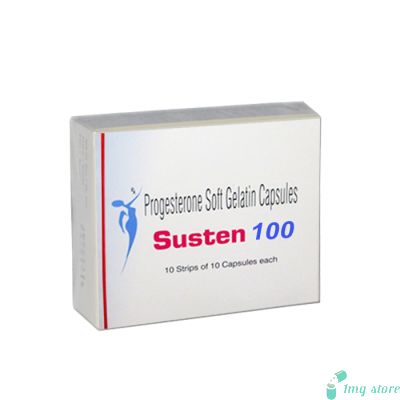Siphene Tablet (Clomiphene Citrate)
Siphene Tablet contains clomiphene, which belongs to the class of medications known as ovulation stimulants. It is also known as Clomid. It is used to help induce ovulation in women who experience difficulties with ovulation and desire to become pregnant. This medication works by stimulating the production of hormones that play a crucial role in the ovulation process.
Information of Siphene Tablet (Clomiphene)
Siphene tablet, also known as Clomiphene, is a medication commonly used to treat Female Infertility. It belongs to a class of drugs called selective estrogen receptor modulators (SERMs). Clomiphene works by stimulating the release of certain hormones in the body, which helps to induce ovulation. Clomid for men is mainly used to address fertility issues related to low testosterone levels or hormonal imbalances.
Here are some key points about the Siphene tablet (Clomiphene):
Indications: Siphene tablet is primarily prescribed to women who have difficulty getting pregnant due to ovulation problems. It is often used in cases of polycystic ovary syndrome (PCOS) or unexplained infertility.
Mechanism of Action: Clomiphene acts by blocking the effects of estrogen in the body. This leads to increased production of follicle-stimulating hormone (FSH) and luteinizing hormone (LH) from the pituitary gland. The elevated levels of these hormones stimulate the ovaries to develop and release mature eggs.
Ovulation Induction: Siphene tablet is commonly used for ovulation induction in women who are not ovulating regularly or not ovulating at all. It helps to establish a regular menstrual cycle and improves the chances of successful conception.
Dosage and Administration: The dosage of Siphene tablets may vary depending on the individual's condition and the doctor's recommendation. Typically, treatment begins with a low dose, which can be gradually increased if necessary. The tablets are usually taken orally for a specific duration, usually starting on the fifth day of the menstrual cycle. The doses should be taken as per instructed by your physician or healthcare provider. If you miss the dose then take it as soon as you remember, however, if it is time for the net dose then skip the missed dose and continue with your prescription. It should be swallowed whole and not crushed, chewed, or broken. If a patient is unable to swallow it, it can be dissolved in water or apple juice.
Monitoring and Evaluation: During the treatment with the Siphene tablet, doctors may monitor the patient's progress through regular pelvic examinations, hormone level assessments, and ultrasound scans. These evaluations help determine the optimal timing for intercourse or other assisted reproductive techniques.
Multiple Births: There is a slightly increased risk of multiple pregnancies (e.g., twins, triplets) when using a Siphene tablet. This occurs in around 10% of pregnancies. Close monitoring and appropriate precautions are necessary for the management of multiple pregnancies.
Success Rates: The success of Siphene tablet treatment varies from person to person. It is essential to understand that it may not be effective for all cases of infertility. Success rates are influenced by factors such as age, underlying infertility causes, and the overall reproductive health of the individual.
It is crucial to consult with a qualified healthcare professional, such as a gynecologist or fertility specialist, for accurate diagnosis, guidance, and personalized treatment options when considering the use of a Siphene tablet (Clomiphene) for infertility.
Siphene tablet (Clomiphene) offers several potential benefits in the treatment of infertility. Here are some of the benefits associated with its use:
Ovulation Induction: Siphene tablet is primarily prescribed to stimulate ovulation in women who have difficulty conceiving due to irregular or absent ovulation. By promoting the release of mature eggs from the ovaries, it enhances the chances of successful fertilization and pregnancy.
Increased Fertility: By regulating the menstrual cycle and promoting ovulation, the Siphene tablet improves a woman's fertility potential. It can be particularly beneficial for women with conditions such as polycystic ovary syndrome (PCOS), where hormonal imbalances disrupt regular ovulation.
Non-Invasive Treatment: Siphene tablet is an oral medication, making it a non-invasive treatment option for infertility. It eliminates the need for surgical procedures and can be easily administered at home under medical supervision.
Cost-Effective: Compared to more advanced reproductive techniques like in vitro fertilization (IVF), Siphene tablet treatment is generally more cost-effective. It may be a suitable initial intervention for couples seeking fertility assistance before considering more invasive or expensive procedures. In the United States, without insurance coverage, the Clomid cost for a 30-day supply of Clomid ranges from $30 to $75. This price can vary between different pharmacies and may also depend on the dosage prescribed.
Widely Available: Siphene tablet is a widely available medication and is commonly prescribed by gynecologists and fertility specialists. It can be obtained at most pharmacies and is often covered by insurance plans, increasing accessibility for individuals seeking fertility treatment.
Monitoring and Adjustments: During Siphene tablet treatment, regular monitoring and adjustments can be made based on the individual's response. This allows healthcare professionals to tailor the dosage and treatment duration to optimize results and increase the chances of successful ovulation and conception.
Potential for Multiple Pregnancies: While it may not be desirable for everyone, some couples may see the possibility of multiple pregnancies as a benefit. Siphene tablet treatment slightly increases the chances of having twins or triplets, which can be seen as a positive outcome for those seeking larger families.
It's important to note that the benefits of Siphene tablets vary from person to person, and success rates can depend on various factors such as age, underlying infertility causes, and overall reproductive health. Consulting with a healthcare professional is essential to determine if the Siphene tablet is suitable and to discuss personalized treatment options for infertility.
Here are a few insurances to consider for Clomid Tablet:
Medical History: Before starting Siphene tablet treatment, inform your healthcare provider about your complete medical history, including any existing medical conditions or allergies. This includes conditions such as liver disease, ovarian cysts (other than those caused by PCOS), abnormal vaginal bleeding, hormone-related tumors, or any previous allergic reactions to medications.
Ovarian Hyperstimulation Syndrome (OHSS): Siphene tablet treatment may rarely lead to a condition called ovarian hyperstimulation syndrome. This syndrome can cause enlarged ovaries and fluid accumulation in the abdomen. Contact your doctor if you experience severe pelvic pain, abdominal swelling, nausea, vomiting, or difficulty breathing, as these may be signs of OHSS.
Multiple Pregnancies: Siphene tablet treatment slightly increases the risk of multiple pregnancies, such as twins or triplets. While some couples may consider this a benefit, it is important to discuss the potential risks and complications associated with multiple pregnancies with your healthcare provider.
Visual Disturbances: In rare cases, the Siphene tablet can cause visual disturbances such as blurred vision, flashes, or spots. If you experience any changes in your vision during treatment, discontinue the medication and consult your doctor immediately.
Driving and Operating Machinery: Siphene tablets may cause dizziness or visual disturbances in some individuals. If you experience these side effects, avoid driving or operating machinery until your vision and alertness return to normal.
Pregnancy and Breastfeeding: Siphene tablets should not be used if you are already pregnant. It is intended to induce ovulation and should be used only as directed by your healthcare provider. If you become pregnant while taking a Siphene tablet, contact your doctor immediately. The safety of the Siphene tablet during breastfeeding is not established, so consult your doctor if you are breastfeeding or planning to breastfeed.
Emotional Changes: Siphene tablet treatment may cause mood swings or emotional changes in some individuals. If you experience significant mood disturbances or emotional symptoms, discuss them with your healthcare provider for appropriate management.
Compliance with Dosage: Follow the prescribed dosage and treatment duration recommended by your healthcare provider. Do not exceed or miss doses without consulting your doctor.
Remember, these precautions are general guidelines, and it is important to consult with a healthcare professional who can provide personalized advice based on your specific medical condition and treatment plan.
Here are some key uses of Siphene tablet Clomiphene:
Ovulation Induction: Siphene tablet is commonly used to induce ovulation in Women's Care who have difficulty getting pregnant due to irregular or absent ovulation. By stimulating the release of mature eggs from the ovaries, it enhances the chances of successful fertilization and pregnancy.
Polycystic Ovary Syndrome (PCOS): Clomiphene tablet is often prescribed for women with PCOS, a hormonal disorder that can cause irregular ovulation or anovulation (lack of ovulation). By regulating the hormonal imbalances associated with PCOS, the Siphene tablet helps restore regular ovulation and improves fertility.
Unexplained Infertility: When the cause of infertility is unknown or cannot be identified, a Siphene tablet may be used as an initial treatment option. It helps promote ovulation and increases the chances of successful conception in cases where no specific fertility issues have been identified.
Assisted Reproductive Techniques: Clomiphene tablet is sometimes used in conjunction with assisted reproductive techniques, such as intrauterine insemination (IUI) or in vitro fertilization (IVF). Stimulating ovulation optimizes the timing of these procedures and enhances their success rates.
Luteal Phase Defect: Siphene tablet can be used to correct luteal phase defect, a condition in which the second half of the menstrual cycle is shorter than normal. By regulating hormonal levels and improving the quality of the uterine lining, it helps support implantation and maintains pregnancy.
It is important to note that the Siphene tablet is primarily used for female infertility and ovulation-related issues. Its use in men is generally limited, and it is typically prescribed off-label for specific male fertility conditions. The specific use and dosage of the Siphene tablet will be determined by a healthcare professional based on individual circumstances and fertility evaluation.
What are the Secondary effects of Clomiphene Tablet?
Hot flashes: Hot flashes are a common side effect of Clomiphene. They are characterized by sudden feelings of warmth, sweating, and flushing of the face and upper body.
Abdominal discomfort: Some individuals may experience abdominal discomfort or bloating while taking Clomiphene. This can range from mild discomfort to more pronounced bloating.
Breast tenderness: Clomiphene may cause breast tenderness or sensitivity. This side effect is usually temporary and resolves on its own.
Nausea and vomiting: Some individuals may experience nausea and vomiting as a side effect of Clomiphene. Taking the medication with food may help alleviate these symptoms.
Headache: Headaches, ranging from mild to moderate, have been reported by some individuals taking Clomiphene. Drinking plenty of fluids and managing stress levels may help reduce the frequency or intensity of headaches.
Mood swings: Clomiphene can sometimes cause mood swings, including feelings of irritability, emotional sensitivity, or mood changes. It is important to discuss any significant changes in mood with your healthcare professional.
Visual disturbances: In rare cases, Clomiphene may cause visual disturbances such as blurred vision, flashes of light, or temporary vision changes. If you experience any visual changes, seek immediate medical attention.
Ovarian enlargement: Clomiphene can occasionally cause enlargement of the ovaries. This may result in pelvic discomfort or pain. Contact your healthcare professional if you experience severe or persistent abdominal pain.
Multiple pregnancies: Clomiphene increases the likelihood of multiple pregnancies, such as twins or triplets. Multiple pregnancies carry additional risks, and it is important to discuss these risks with your healthcare professional.
Q: What is a Siphene tablet (Clomiphene) used for?
A: Siphene tablet is primarily used to treat infertility in women by stimulating ovulation. It is commonly prescribed for women with ovulation problems, such as polycystic ovary syndrome (PCOS) or unexplained infertility.
Q: How long does it take for a Clomiphene tablet to work?
A: The response to Clomiphene tablets varies among individuals. In some cases, ovulation may occur within a few days of starting the medication, while for others, it may take a few weeks. Your doctor will monitor your progress through regular examinations and hormone level assessments.
Q: Can a Siphene tablet increase the chances of multiple pregnancies?
A: Yes, there is a slightly increased risk of multiple pregnancies, such as twins or triplets, when using a Siphene tablet. The risk is estimated to be around 10% of pregnancies. Close monitoring and appropriate precautions are necessary for the management of multiple pregnancies.
Q: Is the Siphene tablet suitable for everyone with infertility?
A: Siphene tablets may not be suitable for everyone. It is important to undergo a thorough evaluation by a healthcare professional to determine the underlying cause of infertility and whether the Siphene tablet is an appropriate treatment option.
Q: Can men take Clomiphene tablets?
A: Clomiphene tablet is primarily used for ovulation induction in women and is not typically prescribed for men. However, in certain cases of male infertility due to hormonal imbalances, it may be prescribed off-label, but this is less common.
Q: Can I take a Siphene tablet without a prescription?
A: No, the Siphene tablet is a prescription medication. It should only be taken under the supervision and guidance of a qualified healthcare professional who can assess your specific situation, monitor your progress, and ensure its safe and appropriate usage.
It is important to note that these answers are provided as general information and should not replace personalized medical advice. Always consult with a healthcare professional for specific questions and concerns related to your individual case.
Here are some important points regarding drug interactions:
Inform Your Healthcare Provider: It is crucial to inform your healthcare provider about all the medications you are currently taking, including prescription drugs, over-the-counter medications, supplements, and herbal products. This information will help your doctor identify any potential drug interactions and make appropriate adjustments to your treatment plan.
Estrogen-containing Medications: Clomiphene tablet works by blocking the effects of estrogen in the body. Therefore, medications or products that contain estrogens, such as hormone replacement therapy (HRT), birth control pills, or certain fertility medications, may interfere with the effectiveness of Clomiphene tablets. Your healthcare provider will guide you on the appropriate timing and usage of these medications in relation to Siphene tablet treatment.
Gonadotropin-releasing Hormone (GnRH) Agonists: The concomitant use of GnRH agonists, which are used in certain fertility treatments, with Siphene tablet may reduce its effectiveness. Your doctor will evaluate the need for combining these medications and adjust the treatment plan accordingly.
Other Fertility Medications: Clomiphene tablet may be prescribed along with other fertility medications, such as human chorionic gonadotropin (hCG), to enhance fertility treatment. Your healthcare provider will carefully monitor the usage and timing of these medications to optimize results and minimize potential interactions.
Other Medications: Certain medications, such as anti-estrogens, anticoagulants (blood thinners), antifungal medications, and some antidepressants, may interact with Siphene tablets. These interactions can affect the effectiveness or increase the risk of side effects. It is important to disclose all your current medications to your healthcare provider to ensure they are compatible with the Siphene tablet treatment.
Herbal Products and Supplements: Some herbal products and supplements may also interact with Siphene tablets. For example, herbal remedies that contain phytoestrogens or have hormonal effects may interfere with the medication's action. It is essential to discuss the use of any herbal products or supplements with your healthcare provider.
Remember, this is not an exhaustive list of potential drug interactions. Always consult with your healthcare provider or pharmacist to get comprehensive information about possible drug interactions based on your specific medication regimen. They will guide you on how to take Siphene tablets safely and effectively while minimizing the risk of drug interactions.
| Manufacturer | : | Serum Institute, India |
| Equivalent Brand | : | Clomid |
| Generic Search | : | Clomiphene Citrate |









